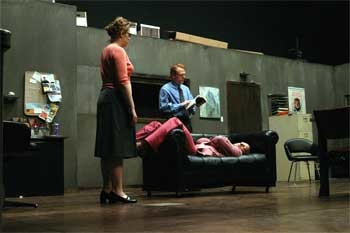
- San Francisco Chronicle February 14, 2020
- The Times of London May 10, 2012
- The New York Times December 16, 2010
- The New Yorker September 27, 2010
- New York Magazine October 6, 2010
- The New York Times October 6, 2010
- The New York Times February 5, 2010
- The Boston Globe May 15, 2009
- The Sydney Morning Herald December 28, 2009
- The Sydney Morning Herald May 19, 2009
- The Chicago Tribune November 17, 2008
- Time Out Chicago November 13-19, 2008
- Chicago Sun-Times November 15, 2008
- The Irish Times October 4, 2008
- The Independent October 3, 2008
- Irish Times September 29, 2008
- ArtForum: Best of 2007 December 1, 2007
- The New York Times Magazine December 9, 2007
- The New York Times September 16, 2007
- The Village Voice September 12-18, 2007
- The Bulletin September 4, 2007
- Publico July 4, 2007
- Die Presse June 17, 2007
- Klassekampen December 12, 2006
- Variety October 1, 2006
- Landboote August 28, 2006
- Tages-Anzeiger August 28, 2006
- The New York Times July 16, 2006
- Het Parool June 16,2006
- 8Weekly June 16, 2006
- Trouw June 16, 2006
- Walker Art Center interview June 8, 2006
- NRC Handelsblad June 2, 2006
- De Volkskrant May 29, 2006
- Le Soir May 24, 2006
- Yale Alumni Magazine November/December 2005
A Slice Of Happiness In The Tristesse Of The Roaring Twenties
“Gatz”: a Great-Gatsby Experiment at the Theaterspektakel.
by Alexandra Kedves
The complete “reading” of the great novel of America’s Lost Generation, “The Great Gatsby” by Scott Fitzgerald, lasted about seven hours. But, although it gradually got cooler in the wee hours at the Rote Fabrik, the American company Elevator Repair Service kept the audience warm — and in the end they received a heated ovation.
Dogears and coffee stains, wrinkled spine and well-read pages: have you ever carried something like that around with you too? A book loved to the very last printed letter? Then you are right for “Gatz,” a performance by the New York theater demolishers Elevator Repair Service. “Gatz” is the entire “Great Gatsby” of 1925: a mammoth reading for all those who still have the movie images in their mind — Robert Redford in the white suit — and for all those who still have the sound of Jazz-Age representative Scott Fitzgerald ringing in their ears. Nothing comes off more despairing, more melancholy, than the decadent Roaring Twenties in this great American novel of the so-called Lost Generation, “The Great Gatsby.”
Life, love: a soap bubble
Many have tried by force to tow this literary masterpiece onto the stage, capture it on the movie screen or even transpose it into music (the first attempt as early as 1926). In contrast, Elevator Repair Service threw in the towel at the outset: the greatness of the book is the book itself, opines John Collins, director of the company (founded 1991), whose tempestuous affair with the novel, which is on every American student’s reading list, has gone on for seven years now. After numerous legal problems, they have finally been allowed in 2006 to perform what is in fact not a performance, but rather a love-declaration to literature: “Gatz.” The Theaterspektakel invited the production here for the program “Black Flowers: (Hi)stories of the 20th Century” and nominated it for the festival prize. “Gatz”: this is no experiment à la Peter Stein’s “Faust” or his upcoming “Wallenstein,” no profession of faith in the theater, dug out of a shimmering mountain of text. “Gatz” is that slice of happiness readers unexpectedly tumble into when they come across one of those magic sentences that’s just as unforgettable as the old tune that was playing in the bar when you had your first kiss. Elevator Repair Service has cut nothing, absolutely nothing out of the script. Along with the narrator, Nick, we visit the Buchanans in their villa. The marriage is seething, but the life of the couple could not be more listless. In spite of constant party-hopping and people-hopping the melancholia remains. Even the great love affair is only a soap bubble.
Reading, love: an eternity
All this takes place while a small employee in a rundown office with one table and a few dust-covered shelves reads (aloud) his ragged favorite book from preamble to coda: “The Great Gatsby” (director: John Collins). The thirty-something man in a pale tie and dull shirt (not dull at all: Scott Shepherd) can’t get his computer to start, so he allows himself a (comprehensive) reading break. And suddenly everyone joins in: the secretary and the coworker, the doorman and the mail sorter. The traffic of New York rumbles offstage, and onstage in the Rote Fabrik the sometimes phenomenal ensemble listens to Fitzgerald’s language, lets it sing so to speak, and withdraws again. In the finale the text seems to make its way through Shepherd’s mouth on its own and clear everything else away, even the book. “Gatz” is that so unrepeatable “real thing,” an earlier, original form, like the name (the unlucky hero was formerly known as Jimmy Gatz). And “Gatz” holds us in its grip. Almost seven hours, and not a minute too long.